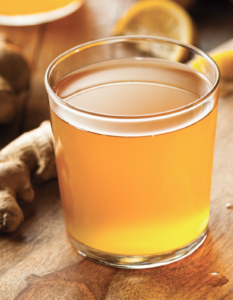Want to know what’s hot in food and beverage?

If ever there was a place in the grocery store where innovation is alive and well, it’s in the beverage category, from apple cider drinks and high-pressure processed (HPP) juices to fermented kombuchas and probiotic-enhanced teas. These days, the beverage aisle is a gallery for innovation.
Yet you might be surprised to know that “innovation” doesn’t always mean reinventing the wheel. As consumers embrace a healthier lifestyle, innovation is about new twists on everyday ingredients. “Old ingredients are coming to life in innovative ways … it’s not your grandma’s apple cider, but flower water added to apple cider vinegar. You want to drink something that makes you feel good but it’s interesting and fun, too,” says Sindy Wise, director of apothecary at Lucky’s Market.
These days, feeling good means choosing beverages that offer pure, clean ingredient profiles with health benefits. “Consumers are more demanding and want to take advantage of all of the nutrients offered in a raw beverage such as HPP juices,” says Laura Colin, business and regulatory director for Ganeden, a maker of probiotics. “They are looking to naturally occurring benefits not lost in processing or pasteurization.”
Beverages were one of the top five product categories where consumers wanted to see probiotics or other functional ingredients.
Added ingredients that offer a clear health benefit, such as probiotics, are on the hot list. “Naturally occurring is fine, but an added benefit is a plus—ingredients can be in a beverage that are an added benefit for immunity, digestive health or just well-being,” says Colin. “We asked consumers if they would like to see functional benefits in products and a large amount would like to see probiotic benefits. Beverages were one of the top five product categories where consumers want to see probiotics,” Colin says of a recent Ganeden survey. Further survey results also showed that 80 percent of 1,000 surveyed consumers would prefer to consume a probiotic or other functional ingredient in a food or beverage. “Whether they are drinking a tea or eating a snack, they want the benefit to already be in there,” says Colin.
Innovation around probiotic beverages isn’t just in the refrigerated aisle. Colin agrees that beverages with probiotics, particularly teas, are a key area of innovation. “You don’t have to go to the dairy case to get your probiotics. You can just get it in a drink. Our [probiotic] ingredient is able to maintain function in a tea product,” says Colin. “We wanted to make sure there was science behind the ingredient and it wasn’t just pixie dust – that it could survive the brewing process,” she adds, noting that Ganeden just published its 28th clinical study. Wise notes that those clinical studies carry weight in a competitive marketplace. “There is a lot of competition out there in every single category, so that extra bit of information definitely helps a consumer make a decision at the shelf.”
With functional beverages, the line between supplements and food is blurring. Organic India, a twenty-one-year-old organic tea and herbal supplement company, has been a pioneer in herbal wellness, offering adaptogenic herbs in formats such as tea, capsules and powders. “People are also increasingly interested in adaptogenic herbs and plants,” says Wise. As people begin to understand that adaptogens support overall wellness and are available in these varying methods of delivery, herbs such as tulsi and ashwagandha are beginning to gain popularity. Already containing adaptogens, “the new wellness teas benefit and cater to a different audience who are looking for probiotics since they are shelf-stable,” says Kyle Garner, CEO of Organic India.
Overall, Wise says, consumers are becoming more educated on what they want and how to attain it. And in the beverage area, she continues to see innovation ahead and consumers who continue to demand and seek out fresh, clean variations on familiar drinks with functional benefits.
